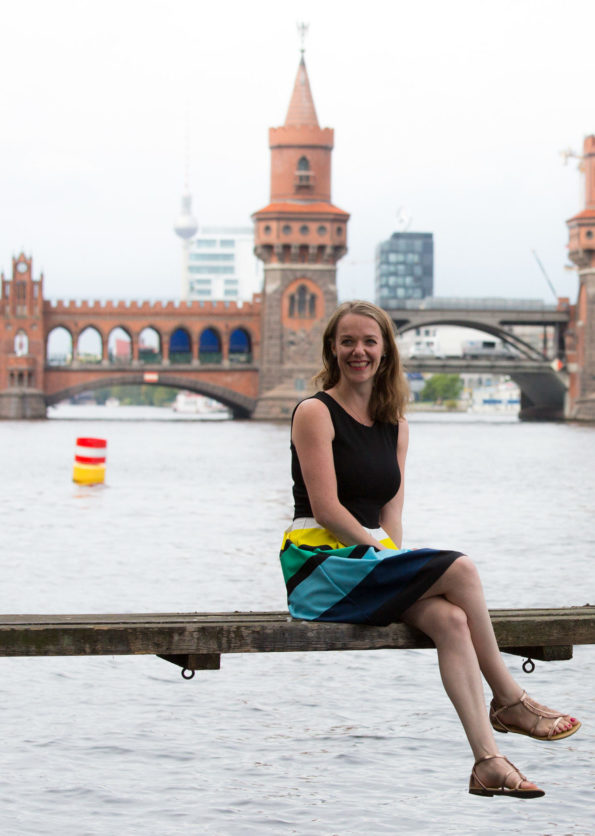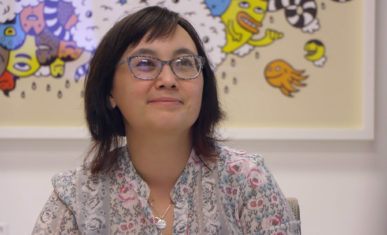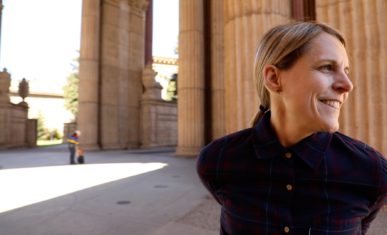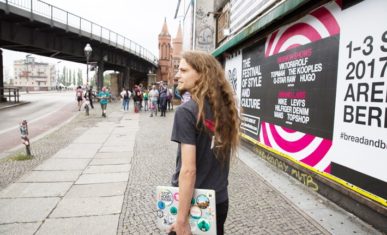Berlin is a mad city. Germany’s capital is pockmarked with tattoos, scars, and statues to its paradoxical past. A city notorious for its history, where invasive surveillance and the urge for freedom clasped hands during a shift change at the border control between East and West. Today the world pulls up a chair to relish the scenes of its daunting past. Berlin is both memorial and haven.
Berlin is also a feeling, and a unique one for those whose roots lie here. Cathleen Berger, Lead, Engagement with Global Internet Fora at Mozilla, is one of them. The world is her well-traveled home, but Berlin has never lost its gravity for her. “If you grow up in a divided city, it doesn’t take much to realize how important privacy is. If you know what permanent surveillance does to people and how it changes their behavior.”

Privacy is the foundation that lets us develop as free and independent human beings
Nowadays, Cathleen monitors for Mozilla the digital developments in politics and societies worldwide. In different fora, Cathleen tries to explain the importance of privacy and security at all levels of the ecosystem – economic, governmental and cultural.
Cathleen presents a diverse range of digital topics for Mozilla, but privacy has a special focus. Privacy is the foundation that lets us develop as free and independent human beings, able to think without interference and define our own ways of living.
Despite its huge implications for our personality, privacy can’t be taken for granted. We need to actively protect it. We need to stand up for it. We need to make clear that no-one can enter this space but us.
“Government surveillance belongs to our recent history in Germany. This kind of surveillance was tangible, people knew about it, they could in some way even see it,” says Cathleen. Today things are different. Surveillance is primarily digital. It’s multi-layered and covers the whole globe. “When we speak about surveillance these days, we don’t just talk about state surveillance, but businesses and companies collect information about users – without similar checks and balances of democratic control.”
Cathleen represents Mozilla’s global engagement at international fora like the United Nations, the World Economic Forum, the G20 and many more. She’s there to speak up for us. To listen to others. To provoke deeper thinking. To pull back the curtain of ignorance and help people see that they are giving away a lot of control over information about themselves without necessarily realizing it. She is also prompting companies and governments to make sure privacy and security remain priority topics in all things digital.
In the international fora, such as the United Nations, the World Economic Forum, the G20, etc., Cathleen represents Mozilla for a wide range of topics to achieve that the internet remains an open, accessible resource. For example, Mozilla has been involved in the Internet for All initiative at the World Economic Forum and is partnering with Digital Opportunity Trust to promote the "Digital Ambassadors Program" in Rwanda.
“I always asked a lot of questions. I always wanted to know more, dive deeper, move something.” Her path is one of those that feels hard to complete while you’re doing it, but which makes sense when you look back at the view. After graduating with a Bachelor’s degree, Cathleen moved to New Zealand to work with Greenpeace on an infrastructure campaign that also examined the country’s digital evolution. Back in Berlin, she studied Political Science and European Studies, focusing on security policy. Her Master thesis concentrated on the newly implemented European External Action Service.
Her promotion was supposed to lead to even deeper digging, but she couldn’t finish her work. After Snowden’s revelations and their implications, Cathleen’s research into data exchange between Germany’s Federal Intelligence Service and the Federal Agency for State Protection became too delicate. “Suddenly, many respondents I talked with about this before, withdrew their consent. So I couldn’t publish my work. As important as I found Snowden’s revelations, I was also very upset at the time.”
But Cathleen has always trodden a special path. While she was struggling to accept that her hard work would have to stay unnoticed, the German Federal Foreign Office opened a new door, that marked the beginning of her shift into diplomacy.
“I’ll never forget the moment I sat behind this sign in a forum for the first time. A sign that said ‘Germany’. That was a moment for me. I never lost the sense of responsibility and also the respect that comes with representing the interests of many.”
Privacy is a fundamental right that’s worth protecting, and just one of the many topics that Cathleen stands up for. All her life she has sought to answer the call of how to bring people together across boundaries, without underestimating the value of the individual perspective. It has always driven her. The interface between security policy and digital innovation. That’s why she’s now at Mozilla. They couldn’t just oversee her work – they wanted to hire her.


